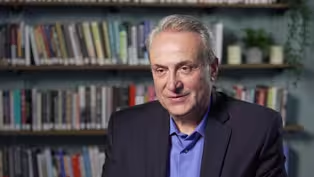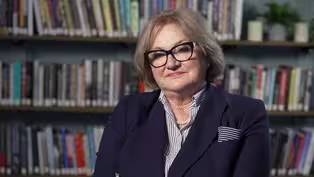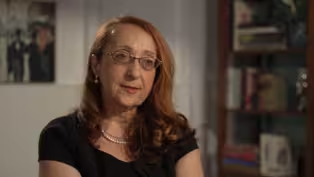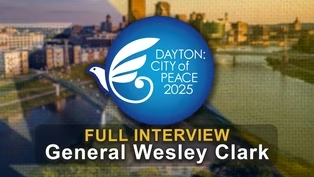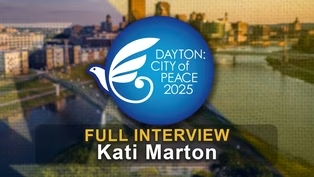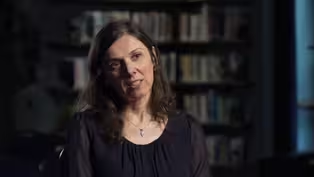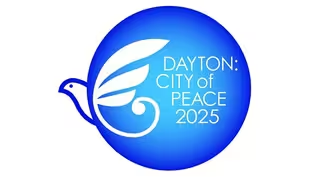
Full Interview: Ambassador Christopher Hill
Clip: Special | 36m 58sVideo has Closed Captions
Amb. Christopher Hill interview, marking the 30th anniversary of Dayton Peace Accords.
As part of ThinkTV's Dayton: City of Peace 2025 project, we continue marking the 30th anniversary of the Dayton Peace Accords, by releasing our full interview with one of the negotiators of the peace agreement, Ambassador Christopher Hill. He joins host Ann Thompson virtually, recounting the chief issues, strategy, and diplomatic efforts that went into bringing peace to Bosnia and Herzegovina.
Problems playing video? | Closed Captioning Feedback
Problems playing video? | Closed Captioning Feedback
ThinkTV Originals is a local public television program presented by ThinkTV

Full Interview: Ambassador Christopher Hill
Clip: Special | 36m 58sVideo has Closed Captions
As part of ThinkTV's Dayton: City of Peace 2025 project, we continue marking the 30th anniversary of the Dayton Peace Accords, by releasing our full interview with one of the negotiators of the peace agreement, Ambassador Christopher Hill. He joins host Ann Thompson virtually, recounting the chief issues, strategy, and diplomatic efforts that went into bringing peace to Bosnia and Herzegovina.
Problems playing video? | Closed Captioning Feedback
How to Watch ThinkTV Originals
ThinkTV Originals is available to stream on pbs.org and the free PBS App, available on iPhone, Apple TV, Android TV, Android smartphones, Amazon Fire TV, Amazon Fire Tablet, Roku, Samsung Smart TV, and Vizio.
Providing Support for PBS.org
Learn Moreabout PBS online sponsorship- Ambassador to Serbia until earlier this year.
And a key player in the shuttle, diplomacy for Peace and Bosnia and the Dayton Peace Accords.
Welcome Ambassador Christopher Hill.
Thank - You very much.
Real pleasure.
- Take us back to the Bosnian War, if you will.
What was the world thinking?
What were you thinking?
- Well, you know, Bosnia is an obscure part of Europe.
I mean a small part of Europe, but anyone who knows a little history knows that's where World War I started.
So there it had some antecedents to to it, but what, what I was thinking at the time was, this is terrible.
It's just a couple years after we had declared Europe whole and free, and yet over a hundred thousand civilians had been killed in that war.
And then the other thing I remembered very well at the time was the idea that the US had just fought the Gulf War and it was the hour of Europe, except Europe wasn't handling it very well.
And yet for a couple of years it looked like the US was just gonna stand by and let the Europeans deal with this without us.
We had Secretary Baker say something to the effect that we don't have a dog in that fight.
And then his successor Secretary Christopher, at one point went to, to Brussels to one of these meetings in NATO and said, well, I'm just here, here to listen.
So I was kinda worried that we were just gonna sit it out and it would get worse and worse.
And of course, along came 1995 and I think a very fundamental decision was made by our president that we need to get involved.
And to this day, I just am very pleased that we had someone of the caliber of Dick Holbrooke who had, who had named me after, you know, interviewing me for 10 seconds one day and named me as the director for the Balkans.
And therefore one of the core team members of the team in the, in the, in the negotiations.
And so when you're a fairly junior officer in a pretty senior position, the other thing running through your mind is, Chris, don't screw this up.
- I guess that it would be important to know why, you know, NATO and the US needed a combination of force and diplomacy to stop the fighting before the peace talks.
Why was that?
- Well, there was a, there had been a NATO force, I, I'm sorry, there had been a UN force there called UNPROFOR.
And usually you have the UN in places where everyone kind of agrees to have the UN but the UN was getting pushed around by all the parties concerned.
So I think it was very important not only to have a, a diplomatic peace track, and that's, I think, always important to have some kind of track there.
But as ____ , the great one said, diplomacy without force is like music without instruments.
You needed some type of means to make sure that when you said something, it was gonna stick.
So combining diplomacy and force, certainly this wasn't the first time, but I think it was done, it was done very well, very effectively.
- You were a key figure, as we mentioned, negotiating the Dayton Peace accords in 1995.
Let's try to remember that.
And what was the atmosphere like there in the rooms at Wright Patterson Air Force Base?
- Well, we had, we had high hopes that we would succeed.
I mean, after all, we had prepped it very well and a lot of diplomacy, like good cooking requires a lot of preparation.
So we were kind of ready for it.
We thought we had a pretty good plan ahead.
And yet we understood that, you know, you wouldn't know until the actual talks.
A big issue was what was the shape of the internal map of Bosnia gonna look like?
What was the constitution gonna look like?
How we were gonna handle in issues like international justice, how was that going to fit in?
Questions like that.
And of course, I mean, the very important aspect was, was this going to leave the transatlantic relationship stronger or weaker?
So there was certainly a lot going on in our minds at the time.
We got to Dayton, and I must say Dayton was a pretty brilliant choice for the, for the whole conference.
It was in the Middle America.
I remember Milosevic complaining mightily about it 'cause he thought we were gonna do it in New York, but it was, it was right out there in Middle America, a lot of support for, for getting this thing done.
So we went right to a meeting and we had all the parties there.
And then we realized, you know, these people are just not gonna agree to anything if they sit together.
So then we began, we began a long, arduous process of shuttle diplomacy as going to one set of hotel rooms and then going to another set, never bringing the parties together until the very, the very end.
And we were very much concerned that it wasn't going to work.
In fact, at one point Ambassador Holbrooke told us to pack all our bags, put them out on the sidewalk, and to try to convince the parties involved that, Hey, if they don't get serious, we're we're gonna leave ourselves.
I can't say it really.
That really worked.
'cause they understood correctly that we had a lot engaged in this.
Putting it in the United States was a pretty powerful signal that the US really cared about the outcome.
- And speaking of that, what were the most difficult concessions to secure from each party?
The Serbs, the Croats, the Bosniaks, and how did you manage those tensions?
- Well, it, it was tough.
I mean, the, the, the Bosnian Muslims as, as they were called then now called Bosniaks, were very much an aggrieved party.
If you look at the attacks on civilians, a lot of it were attacks on Bosnian Muslims, but they weren't the only ones.
I mean, Croatian, ethnic Croats were, were very much feeling as victims as were the Serbs.
So everyone felt as a victim, and when everyone feels as a victim, it's hard to get people to make concessions.
So I would say the big issue was how do you square the circle of having a country that is Bosnia, but one in which it's not going to just be up to its citizens.
You had to give the citizens, in addition to the individual rights, for example, that American citizens have, according to our constitution, there was a concept of group rights, a sort of overlay onto that.
And that was tough to do.
In addition, you had a kind of territorial mix, remember there was something called the Contact Group plan, which was developed two or three years earlier.
And the concept was 49% for the Serbs, 51% for the so-called Bosnian Croat Federation.
So the question was, how are these two different entities going to live together under one roof?
So these were issues that had not really been tried before.
And so there we were kind of without a lot of experience to go on.
- Now you mentioned the time where you were kind of packing up to show that you were gonna leave.
Think back to the moment during the Dayton Peace Talks, when you had to adapt your entire approach, mid negotiation, maybe it was that point.
What happened and what did you learn and how did you pivot?
- Well, again, it was very hard to convince the Bosniaks who were the main victim of the war, very hard to convince 'em that they had to make concessions.
So a lot of areas in what became as the Serbian, what be what developed as the Serbian enclave, a lot of Muslims had lived there, had been ethically cleansed from their land.
And even though the, the agreement called for everyone's right to return, we didn't use that expression, but that they had a right to go back.
Realistically speaking, we knew it was going to be difficult.
So a big problem was in convincing the Muslim entity, especially the President Izetbegovi that he's not going to get everything that he wants.
And then there are a lot of people who were of tangentially involved, you know, non-governmental people who really felt that we were being excessively fair to the Serbs.
And our view was we wanted an agreement that would last.
There's no point in jamming one side if in so doing you create a situation where the war starts again.
So it was very hard.
The, the toughest conversations I would say were with the, with the Muslims 'cause we had a lot of sympathy with them.
But ultimately they were going to have to make, make concessions.
- You talked about how welcoming Dayton was, or at least the fact that it was a good choice with everything happening at Wright Patterson.
How aware were you and the team of Dayton's community support for what you were endeavoring and their outreach efforts like billboards and even vigils wishing for peace?
- Well, the most amazing visual to me is the following.
We had a lengthy discussion with various parties.
It went into the, the night we had dinner with, with some groups of them.
And it was really tough.
It was kind of in the middle of the negotiation when you're in the middle and these things, you're really in the muddle because you don't really know what's going to happen.
So we got back to our, to the US delegations, hotel rooms, which went down a, a long corridor.
And so we got in kind of discouraged.
It was after dinner, so it must have been 10 o'clock or something.
So we go in there and then on the side of this narrow hotel corridor were all these colored pictures, eight by 10 pictures that every elementary school kid in Dayton had done with the question being, write a do a drawing of what you believe peace looks like.
So all over these elementary schools in Dayton, in the area, you kids had the same assignment.
And then they took a stack of these, and I swear it was in the hundreds, and somebody and I, I wish I knew who did it, plastered them on this wall.
Usually it was pictures of the sunshine in the corner of the, of the picture and then kind of stick figures of mothers and fathers holding the hands of their, of their children and you know, trees and green grass.
And that was a concept of what peace looks like.
But I could tell you, you know, you're at this point, you're, you're, you're kind of a, I mean, I wasn't that old, but I just felt like a grizzled old diplomat, you know, dealing with these messy, miserable assignments, ending up hating everybody you've dealt with, even though you're trying to help them all.
And then you, you get into the, into our hotel area and you see all these idyllic pictures of what we're aiming for.
And I will never, ever forget that as a side of what this meant to people in Dayton.
Both those kids who did that, and their teachers who told 'em to do that.
And presumably someone told the teachers to tell the kids to do that.
Amazing.
- That's great.
And so did that kind of reenergize you?
- I I must say it did.
It did.
I must say it, you know, hard to say.
I mean, we weren't gonna fail.
I mean we're, we're, you know, American diplomats, we, we don't like losing and losing would've been people going back without an agreement.
The war starting again, the world having given its best shot that is having the Americans involved in this directly with the understanding that we were gonna have American troops on the ground.
That was a big thing.
American troops on the ground.
So no more of this UN you know, powdered blue helmet thing.
We're gonna have real live NATO forces on the ground.
We, we weren't gonna lose this thing.
But at the same time, you know, even when you, you have this gritty determination, you're gonna win.
It's awfully nice to see people who believe in you.
- There's a perception that the Dayton Peace accords were a triumph of shuttle diplomacy and in many ways they were.
And backroom negotiation.
What myths or misconceptions would you say about the process that you would like to correct?
- Well, it was, it was very tough.
But I think the main myth is you had good guys and bad guys and we were going to reconcile good guys and bad guys.
And that is something the good guys and bad guys have to do themselves.
What we could do was to create a circumstance where they could understand how governance worked.
They could understand because they were part of putting it together.
What the constitution was, what it was not.
And that ultimately they had the means, they had the, you know, we had troops on the ground to make sure nothing went wrong.
And by the way, nothing ever did go wrong.
And so I think we, we really gave them a, a chance at peace.
As you, as I'm sure you know, this has been a, a difficult process, but I think, you know, most of all the concept was that you don't have a right to, no country has a right to have civil wars where hundreds of thousands of people are displaced or killed.
They have to understand that the international community is going to play a role in that.
And I think the, in preventing that and making clear that people understand that, you know, we're not gonna allow them to continue with this.
And that was certainly what what we did.
We brought the US and Europe closer together.
And I guess all the detractors were saying, well, you're just carving up Bosnian creating three countries.
And that's really a myth.
It's one country, it's one country with a lot of problems.
By the way, a lot of countries have problems these days.
And certainly Bosnia is no exception, but it, it's, it's clear no one, no serious person is saying that we carved it up for the purpose of of having more than one country.
- Looking at Bosnia and Herzegovina today, do you feel that the Accords provided sustainable peace or did they freeze certain conflicts in place?
- Well, I think it provided the, as I try to lay out, it's, it provided the framework for, for peace.
You know, it's a part of the world where you often blame the foreigner for coming in.
For hundreds of years they blame the Ottoman Turks for decades, they blame the Austro-Hungarian empire.
And now you see people saying, well those Americans, they never really understood it.
And so they try to blame us, but in fact, I think we created a circumstance where they have the capacity to deal with this.
They, they know what they have to do.
Unfortunately, there, there, there may not be war criminals there, but there are just plain old peace criminals, people stealing money and that sort of thing.
And they have to, they have to deal with that.
But most of all, I think the parties themselves have to deal with each other.
And the idea that you can tattletale to the international community and the international community will drop everything and, and come and help you out doesn't work that way.
And so I think for, for the Balkans and I, I've spent a lot of time there, there's an understanding there, a dawning understanding that they need to work things out with each other and not just come to the great powers and expect us to solve their problems.
- What did the Dayton process teach you about the limits and possibilities of diplomacy during active conflict?
- It taught me that you always need a channel for diplomacy.
You have to be able to talk to all sides.
And that's a tough one.
I mean, later on in my career I was dealing with North Korea and I was being excoriated for the fact that I talked to the North Koreans, I'm sorry, you're not going to deal with the North Korea, with North Korea unless you talk to the North Koreans.
So I think for Americans who think we can only talk to the guys we like as opposed to the guys we have some real difference with.
I think Dayton was an example where you gotta have a channel and you've gotta talk to people all the time and sort of understand their point of view.
And I think at certain points it's very important to sit and say, what do you see?
What do you see coming out of this?
And to understand what's really important to them.
And when you know what's important to the various sides, you can maybe put it together.
One hopes you'll have less emotion into it.
And I think it's very important not to be emotional about this, to keep always in mind what is the US interest here and what do we wanna accomplish for our country?
Because I think a peaceful Balkans is in our country's interest, but we don't need to be taking sides on on some of these issues.
So I think that's very important.
And I think it's very important in diplomacy always to have a kind of compass where you're heading, where you're heading to what you feel the ideal outcome is going to be.
You're not gonna have a straight line to that outcome.
You're gonna have to do a lot of detours.
But when you have a compass, when you know where you're heading, I think ultimately you can get there even if you have to take a lot of detours.
- Once the accords were signed, then the hard part really began implementation.
What were some of the biggest surprises or setbacks you encountered during this phase?
- You know, first of all, once the accords are reached, it's like someone buying a house.
There's something called buyer's remorse.
And so what you don't want is a situation where they agree to it and the spur of the moment and then they're thinking, gee, I've gotta go home and explain this to people.
So once you get parties agreeing, you need to kind of surround them by saying, Hey, this is going to work.
So my job was to go over to Slobodan Milosevic, who was the Serbian leader and to make sure that he was good to go on this.
Other people talked to Izetbegov and to the Croat side.
So that's the first issue you gotta deal with.
The second issue is to show that you are as serious about the follow up as you are about the getting the peace process.
You know, too often you hear about some peace process in some part of the world and then the world forgets and kind of moves on and people are left with something that's very hard to, hard to implement.
'cause often these things are hard to implement because they're negotiated documents where you're trying to make everyone reasonably happy.
So I think in Dayton we wanted to make sure that that NATO force, which was led by the United States, was going to be on the scene very quickly.
And it was despite some real challenges, getting our, getting our troops there in there in very quick order.
Second thing of course, in addition to getting the military lined up and making sure too that people don't revert to bad habits, you don't, you didn't want checkpoints being set up on the roads.
I mean, a British general once said to me, every Balkan kid's ambition in life is to run his own checkpoint.
Well, you don't want every kid to realize that ambition.
You wanna keep the so-called freedom of movement going and, and if there are examples where it's not, then you've really gotta be tough and take it down.
So we were successful I think with that.
And of course getting the, the structures we had, the Europeans very much engaged.
We had a former Swedish Prime Minister, Carl Bildt, who became the high representative of the European Union there.
And, and the US had the deputy there.
So we, we had this whole panoply of, of bureaucratization, if you will, of the process.
So I think everyone kind of got the hint, it's over, there's no going back to this war, it's over, we're moving along.
And so I think the speed, the force, the alacrity really with which we did that was very important in terms of the implementation.
Today we have a situation in Bosnia where people feel they can get away with things like, well we don't wanna do that.
Well, at a certain point you have to say you're gonna have to do that.
And I think we've got enough institutions to make that work, but it's, you know, it's a problem coming every day is - How did the international community, especially NATO and the EU, support or complicate the post Dayton reconstruction efforts?
- Well, I mean I think NATO did a great job, frankly, American troops on the ground.
We had four star generals working this problem.
And it was, I, I think the military piece was, was very, very successful.
Bureaucratically, it's a lot tougher.
Of course we had elections which we had to go through and elections are often the stress test of a democracy.
So you've got this nascent democracy and then you're trying to have elections for at the entity level or elections at the national level.
And you wanna make sure that those go ahead with enough local participation that you want the turnout to be good enough and you want the thing to be run by the locals, not just run by the international community.
So these were, these were really tough issues to, to get through.
And I, I think generally we got through it.
Ultimately the problem will be, can you attract foreign investment?
Can you get these countries, Bosnia being a main example, can you get them into a broader structure?
You know, no one wanted to be in that broader structure known as Yugoslavia.
They all wanna be in the broader structure known as the European Union.
And the other thing is they don't want the Americans to turn our backs and say, this isn't important to us, we're onto other things.
So it's very difficult to, you know, once the adrenaline is gone, you then want to kind of stress through the structures you've set up that you're still here and you will be here.
- So you know the area very well.
Nearly 30 years on, as you referenced, Bosnia is still grappling with nationalism and a lack of functional central governments.
Do you think it's time for Dayton 2?
- In the US?
Sometimes people say, well we need to look at our constitution and have a new constitutional convention.
And I think calmer minds usually said, whoa, that may create more problems than it solves.
I think that's very true in Bosnian.
Do I think some things need to be fixed?
Yes, but what I would like to see is more an effort to get the, the local governance to work together on this and to understand that we're not gonna leave them alone till they do.
So I think none of the problems that have come up to me are structural.
They have to do with bad leaders doing bad things.
I think the basic constitution that was worked out in Dayton, by the way, with the agreement of the parties can work.
The issue is to make people understand that this is what's going to work.
The minute you start talking about, well, we'll turn the whole system upside down with data too, I think is an invitation for more problems than solutions.
- I'm wondering about the Dayton model and could you apply it to other international situations like Ukraine, Gaza, or elsewhere?
- Yeah, you know, these, these things, whether it's Dayton model or any other model, you know, these problems, countries have their own history, they have their own issues.
Sometimes the problems are unique, sometimes they're not.
And so I am not so convinced that something like Dayton would work in someplace like Gaza.
I think some of the concepts are very true.
You've got to have the European Union working together with the US If we're talking about a European problem, you've got to have really good, good connections there.
And I think we've, we've tried to do that over the years.
Blaming the European Union, to me is not a recipe for success here, or allowing the European Union to blame us.
I don't think that's, you know, you don't want these count, these small countries to look at at, at the European Union, the US fighting all the time.
And then they think they can have a kind of a shop for a better initiative for their, for themselves.
So we need to be able to work together.
But whether ultimately a situation like Ukraine or a situation like Gaza can be informed by the overall, the, the kind of legal structures we set up, the military structures we set up.
I'm not so sure, I think they can be informed by our sense of urgency at the time and our sense that we have to work together on this, otherwise we're gonna have a lot more problems like this and we won't have any capacity to deal with 'em.
So I think the positive energy that we had vis-a-vis other countries, I think was very important and, and addressing this.
And I think it'll be very important in addressing any other issue.
- But maybe we keep it in our back pocket, this particular model of isolating the leaders in case it does make sense sometime, - You know, I think when you've gotten to a point where you think you have the solution, that's when you bring people together, when that point comes, you have to be very sensitive.
'cause you don't wanna bring everyone together and have it fail.
So that moment where you bring people together is, is a real judgment call.
And you have to have people with good judgment, make that call.
You know, I would also add an issue.
People always talk about cease-fires.
And in Dayton, you may recall we didn't do a cease-fire until just before the actual negotiations in Dayton.
Even though we had been working months, in some cases people had been working years.
So the point was, by the time we had a cease-fire as we went to Dayton just a day, you know, a couple of weeks actually before Dayton, everyone kind of knew, okay, this is it.
And the thing about cease-fires is people respect them when they realize this is what's gonna happen.
This is what it's gonna look like, and I don't wanna be the last person to die from my country or die from my cause.
So that's when cease-fires work, I understand people look at a conflict and they wanna cease-fire immediately.
But we've seen so often in the Middle East and, and elsewhere, frankly, the cease-fires get broken.
They have another cease-fire and before you know it, they're competing in the Guinness Bur book of world records for how many cease-fires you're gonna have.
I think we're 150 in some conflicts.
So you, it it, you have to be a little steely about it.
You've gotta say, no cease-fire, yes, we, we can stop it, but it'll start again and then we're gonna be in worse shape.
And I think in Dayton we made the right decision not to do it until everyone kind of knew this is it.
- As someone who has served in diplomatic and educational roles throughout their career supporting peaceful engagement and conflict resolution, I'm wondering what role can everyday citizens play to support peace around the globe, whether they're from Dayton or some other city?
- Yeah, it's, you know, I think Dayton really, we were surrounded by a cocoon of very positive feelings about what we're doing.
And that was wonderful.
I think generally what's different now between Dayton and today is everyone today thinks they're an expert.
'cause they can get on their computer and look up something and feel that in a 20 minute reading of some website, they know as much as a negotiator does, who's spent 20 years on it.
So I think, I think it's very important to inform the public and maybe to make sure that the public understands the complexity and complexity of it.
I know there's a tendency to wanna make it simple so people can feel that they understand it, but in simplifying it, that creates a situation where you get a lot of stray ideas that may not be helpful.
So I really think it's very important to keep publics informed.
I think the United States in particular, we gotta up our game on this.
I mean, I think it was Mark Twain who said, Americans only learn about geography from war.
That's not enough.
We, I need to do a better job of that in our schools, et cetera.
And then, you know, I I, I think in engaging our public, I mean, I've tried, I've gone to elementary schools, to postgraduate programs to talk about what we're doing and to try to try to get people enthusiastic about this line of work.
You know, diplomacy is not, it, it, it offers no refuge for those in need of instant gratification.
And I think maybe American citizens need to understand that there's no instant gratification for these issues.
It's gonna take, it's a real slog to get through them.
And I think we, we've gotta do a better job as a society to understand these problems.
And when we do, I mean, America is kind of driven by two impulses.
There's the sort of MacGyver, get it done, you know, use whatever you got outta hand, make sure or just get it done.
I, I, I'm from that school.
And then there's the sort of notion that we are talking in just these vague generalities about, you know, like a secular religion.
Well, there's a role for having that sort of overall approach and for being inspired and, and by it, but you really gotta be practical on these things, otherwise you're just not gonna get the job done.
- As you point out, diplomacy certainly isn't easy.
And as we look forward to for the Balkans or any, what do you see as the role of the US and NATO in supporting and sustaining peace?
- Well, I think NATO has done an extraordinary job of keeping the peace in Europe.
I think the, the situation in Bosnia, I mean this was basically an outgrowth of the collapse of the Yugoslav state.
I don't think the western countries were quite prepared for it, but ultimately I think dealt with it.
I think Ukraine is a, is a hideous problem caused by the Russia's effort to re reconstitute itself as the Soviet Union.
With those exceptions, I think NATO has been extraordinary in terms of keeping the United States engaged in Europe.
You know, we're not in the European Union, we're NATO.
And two times in the 20th century we had to go back to Europe in very unpleasant circumstances.
Normandy being the best example, it's not the easiest way to reenter a, a continent.
So I think staying engaged in it, staying engaged with our European partners is, is absolutely critical to keeping the peace in Europe and to those who say, well, Europe's far away.
No it isn't.
It's very close.
And in so many ways, our two North, North America, I'm including Canada here and the US we are absolutely engaged every day with our European friends.
And we need to keep that up.
And it's frustrating at times.
I think it was Napoleon who once said, my greatest strength is that I have no allies and referring to all the bickering that goes on among allies, but it, it is a, a rather bitter irony that he met his fate at the hands of a lot of allies who worked together and defeated him.
So I think we need to understand that in our, in our alliance is great strength and we need to understand it has served us very well, it served our interests.
And one should understand that serving interests is a little more subtle concept than just serving us.
You know, it's not just a matter of, oh, what do we get out of this?
Our interests are broader and I think we've, we've, our interests were well served by our decision to get very involved in the Balkans.
And I might add one other point that since Dayton with all the problems that you allude to the problems of treaty, maybe we need another Dayton.
I think it's important to understand that no one has been killed in anger in that country since the Dayton piece of cord was signed.
- One final question.
You've shown both frustration and admiration for the diplomatic machinery of the US government.
How would you assess the state of American diplomacy today compared to the years that you served?
- You know, I think if you're not frustrated with something, you're probably not getting stuff done.
It's not a question of just admiring problems, it's, it's a matter of seeing that there's a problem and go out and find a solution.
And I think it's been very important to have American diplomats.
I mean, American diplomacy is not some oxymoron.
I mean, it's not some contradiction.
We've had some great diplomats and so I think we're very good at it, frankly.
And I think the current administration needs to understand better that we are good at it.
And perhaps there should be a little less finger pointing and a little more handshaking and working things together because diplomacy is a lot better than fighting wars.
And to the extent that diplomacy keep us outta wars, we should support it.
- Ambassador Christopher Hill, thank you for your thorough and thoughtful answers.
- Thank you.
Video has Closed Captions
Clip: Special | 5m 54s | Adnan, born in Bosnia and Herzegovina, survived the Bosnian War, before moving to the US. (5m 54s)
Video has Closed Captions
Clip: Special | 6m 27s | Azra, a journalist from Sarajevo, started a successful culinary business in Dayton. (6m 27s)
Video has Closed Captions
Clip: Special | 5m 58s | Dr. Alma, a pediatrician born in Sarajevo, tells her story during the Bosnian War. (5m 58s)
Full Interview: General Wesley Clark
Video has Closed Captions
Clip: Special | 33m 17s | Interview with retired Gen. Wesley Clark on ending the Bosnian War. (33m 17s)
Video has Closed Captions
Clip: Special | 40m 55s | Interview with Kati Marton, widow of Dayton Peace Accords negotiator Richard Holbrooke. (40m 55s)
Video has Closed Captions
Clip: Special | 5m 42s | Meet Irena, an educator whose journey began in Konjic, Bosnia and Herzegovina. (5m 42s)
Dayton: City of Peace 2025 Preview
Video has Closed Captions
Preview: Special | 30s | A new ThinkTV-produced honoring the 30th anniversary of the Dayton Peace Accords. (30s)
Providing Support for PBS.org
Learn Moreabout PBS online sponsorshipSupport for PBS provided by:
ThinkTV Originals is a local public television program presented by ThinkTV
